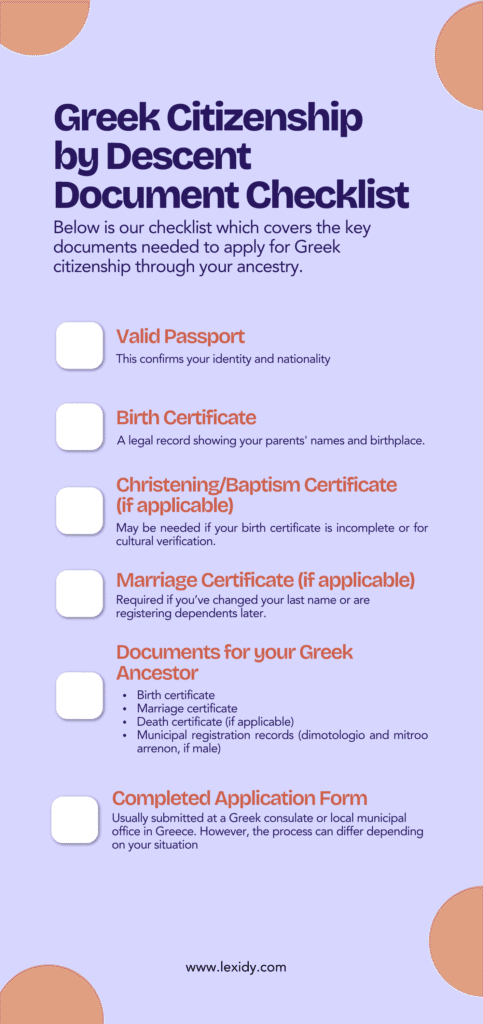Do you have a connection to Greece through your family line? Whether it’s a childhood story from a grandparent, a family name on a town registry, or a desire to live and work freely in Europe, claiming your Greek citizenship by descent could turn that connection into something powerful: a second passport, EU rights, and a stronger link to your past.
This guide explains everything you need to know about Greek citizenship by descent. From who qualifies, to which documents you’ll need, how the process works, and what benefits await once you’re officially recognized as a Greek national.
(Article Updated August 2025)
Table of Contents
- Who Qualifies for Greek Citizenship by Descent?
- Greek Citizenship by Descent Requirements
- Documents Needed for Greek Citizenship by Descent
- Step-by-Step Process for Greek Citizenship by Descent
- How Long Does it Take to Get Greek Citizenship by Descent?
- Common Mistakes and Delays When Applying for Greek Citizenship by Descent
- Frequently Asked Questions About Greek Citizenship by Descent
- How Lexidy Can Help
- Ready to Apply for Greek Citizenship by Descent?
Who Qualifies for Greek Citizenship by Descent?

Greek citizenship can be passed down through generations, but only if each link in the family chain is legally documented in Greece.
You may be eligible if you meet one of the following conditions:
- You were born in Greece, and at least one parent had legally resided there for five years.
- You have a Greek father or mother. If your parents were not married and your father was Greek, a formal recognition of paternity must have taken place through a notarial act or a court decision. The process for acquiring citizenship depends on whether this recognition occurred while you were still a minor or after you became an adult.
- You were adopted by a Greek citizen, following legal adoption procedures.
- You have a grandparent who was born in Greece or was naturalized as a Greek citizen.
- You were born outside of Greece, but can prove your Greek ancestry through civil documents.
A key concept in this process is the need to prove a direct bloodline relationship between the applicant and the Greek ancestor. This requires providing documentation that officially connects each generation through civil records.
If someone in the line was never registered, lost their Greek nationality, or needs to be re-registered, the chain must be restored for living individuals only. It is not possible to reinstate Greek citizenship for someone who has already passed away.
Important: While there is no official generational limit, the entire lineage must be properly documented. The further back your ancestor is, the more time-consuming the process may be.
Greek Citizenship by Descent Requirements
While each case is unique, most applicants will need to meet the following general requirements to qualify for Greek citizenship by descent:
- Proof of Greek ancestry through official documents, such as a Certificate of Family Record or a Certificate of Male Registry issued by the Greek authorities.
- Evidence of a direct bloodline relationship, showing that each generation was properly registered (or re-registered if necessary) in Greece’s municipal records.
- Valid personal identification, such as a passport or national ID card.
- Official translations and apostilles for all foreign documents, though specific requirements depend on the Consulate handling your application.
Special Note on Unregistered Parents
If your qualifying parent was never registered in Greece, they may first need to be formally recognized in the municipal records before your own application can proceed.
This scenario applies only if your parent must pursue naturalization based on their own grandparents’ Greek citizenship. It is a more complex route and not always guaranteed, so expert legal guidance is highly recommended in these cases.
Greek citizenship law can be tricky. Get expert legal guidance for your citizenship by descent application.
Documents Needed for Greek Citizenship by Descent

The documents you need will depend on who your qualifying ancestor is, whether it’s a parent, grandparent, or even a great-grandparent. Keep that in mind as you review the list below.
- Your Valid Passport: This confirms your identity and nationality
- Your Birth Certificate: A legal record showing your parents’ names and birthplace.
- Christening or Baptism Certificate (if applicable): May be needed if your birth certificate is incomplete or for cultural verification.
- Marriage Certificate (if applicable): Required if you’ve changed your last name or are registering dependents later.
- Documents for your Greek Ancestor: This includes their:
- Birth certificate
- Marriage certificate
- Death certificate (if applicable)
- Municipal registration records (dimotologio and mitroo arrenon, if male)
- Completed Citizenship Application Form: Usually submitted at a Greek consulate or local municipal office in Greece. However, the process can differ depending on your situation:
- If you are a resident abroad, you will need to submit your application and supporting documents to the Greek Consulate with jurisdiction over your place of residence.
- If you are a permanent resident of Greece, you may submit your application to the locally competent Directorate of Citizenship.
- If you or your ancestor have undergone a name change, a relevant court ruling or administrative act must be submitted along with the application (or at any stage during the naturalization procedure).
Step-by-Step Process for Greek Citizenship by Descent

Applying for Greek citizenship through ancestry involves multiple legal steps. The process varies depending on whether your Greek connection is through a parent or grandparent, and how complete your documentation is.
Step 1: Confirm Your Eligibility
Review your family history to confirm you have a direct bloodline to a Greek citizen. Your ancestor must have been officially registered in Greece’s municipal records.
Step 2: Gather and Prepare Your Documentation
Collect all necessary birth, marriage, and (if applicable) death certificates for each generation. These documents must be apostilled or legalized and translated into Greek by a certified translator (depending on the consulate). Pay special attention to name spellings and date consistency across documents.
Step 3: Verify Registration in Greek Records
Ensure your Greek ancestor is registered in Greece’s municipal registry (dimotologio and/or mitroo arrenon).
If applying through a grandparent, your parent must first be registered and must also wish to acquire Greek citizenship. In addition, your parent must be alive at the time of the process. This step often takes time, especially if multiple generations need to be added to the registry.
Step 4: Book Your Appointment at a Greek Consulate
Once your documents are ready, schedule an appointment with the Greek Consulate or Embassy responsible for your country of legal residence. Due to high demand, consular appointments often book several months in advance.
If you are a permanent resident of Greece and hold a valid residence permit, you may instead submit your application to the locally competent Directorate of Citizenship for your area.
Step 5: Submit Your Application
If your application for Greek citizenship is based on descent from a Greek grandparent or great-grandparent, the naturalization process will apply.
This includes an interview conducted in Greek by a competent consular officer, where you will be expected to demonstrate a connection to Greek ethos as well as adequate knowledge of Greek history, culture, and intellectual heritage.
Step 6: Registration and Citizenship Certificate
Once approved, you will be registered in the municipal records (dimotologio). Your citizenship status is then established through the Certificate of Family Status, where your name appears with a standard entry. If required, you may also need to take a short Oath of Citizenship.
Step 7: Apply for Your Greek ID and Passport
With your family status certificate in hand, you can apply for a Greek identity card and passport, unlocking full access to the rights and benefits of EU citizenship.
How Long Does it Take to Get Greek Citizenship by Descent?
The timeline for Greek citizenship by descent depends on who your qualifying ancestor is and how complete your application is.
- If applying through a Greek parent, processing typically takes around 1 to 2 years, although the timeline can vary depending on your specific case.
- If applying through a Greek grandparent or great-grandparent, processing may take 2 to 3 years.
Processing times can also vary depending on where the application is submitted and the current workload of the citizenship authority in Greece or the consulate handling it. Whether you apply in Greece or abroad, delays are often caused by incomplete documents, translation issues, or requests for additional information.
In most cases, the process takes several months to over a year. Careful preparation and professional legal guidance can help reduce setbacks and keep things moving smoothly.
Common Mistakes and Delays When Applying for Greek Citizenship by Descent
Applying for Greek citizenship by descent can be straightforward, but only if your documentation is airtight and your eligibility is clearly established. Here are the most common reasons applications are delayed or rejected:
Missing or Inconsistent Documents
Gaps in civil records, name mismatches, or conflicting dates across generations can halt the process. Greek authorities require complete and traceable documentation for each link in your family line.
Untranslated or Non-Legalized Records
All foreign documents must be officially translated into Greek and apostilled or legalized. Submitting informal or uncertified versions will lead to immediate delays.
Misunderstanding Eligibility
Many applicants assume that having a Greek surname or distant ancestry is enough. In reality, eligibility is only recognized if your ancestor was officially registered in Greece and each generation is documented.
Incorrect Assumptions About Rights
Some believe that citizenship is automatic or that having Greek heritage means you’re already a citizen. In truth, the legal status must be formally claimed and approved.
Even strong cases can be slowed down by small administrative errors. A legal review before submitting your file can help avoid these issues, especially if your family history is complex or if you’re missing key records.
Want to avoid costly mistakes? Get legal clarity on applying for Greek Citizenship by Descent.
Frequently Asked Questions About Greek Citizenship by Descent

1. Can I apply if my grandparent was Greek but never registered in Greece?
Yes, but only if your parent is alive and expresses the will to obtain Greek citizenship. In that case, your parent must be registered first, which adds an extra step and may extend the timeline.
In all other situations where the application is based on descent from Greek grandparents or great-grandparents, the naturalization process will apply. This includes an interview conducted in Greek before the Consul, where you must demonstrate knowledge of Greek history, culture, and ethos.
2. What if I don’t have every document?
You’ll need to provide alternative proof or request copies from Greek or foreign authorities. Missing documents are one of the most common delays.
3. Can I include my children in the process?
Children under 18 can usually be included once your citizenship is approved. Adult children will need to apply separately.
4. Can I have dual citizenship with Greece?
Yes. Greece allows dual nationality, so you don’t need to renounce your current citizenship.
5. Do I need to speak Greek to qualify?
Not for descent-based applications. Language requirements apply only in naturalization cases.
How Lexidy Can Help
Applying for Greek citizenship by descent is exciting, but the paperwork, timelines, and cross-border requirements can quickly become overwhelming. That’s where expert support makes all the difference.
Lexidy’s legal team helps streamline every step of the process:
- Confirming your eligibility based on your family history.
- Advising and verifying all required documents, even across generations.
- Handling certified translations and apostilles so that nothing is rejected.
- Filing your application through the proper channels and managing follow-ups with Greek authorities.
Whether your ancestor’s records are incomplete, your family tree is complex, or you simply want to avoid delays, expert guidance can save you months of stress.
Talk to a Greek immigration lawyer to assess your eligibility and simplify the process.
Ready to Apply for Greek Citizenship by Descent?
Greek citizenship by descent offers a unique chance to reconnect with your heritage, expand your global rights, and create new opportunities for yourself and your family. For many people with Greek ancestry, this pathway is entirely within reach.
But success depends on more than lineage. It requires the right documents, proper registration, and a clear legal strategy. That’s why exploring your family history with expert legal guidance can make all the difference.
Ready to get started? Speak with a legal professional who understands the process inside and out, and take the next step with confidence. Fill out the form below to get started!

